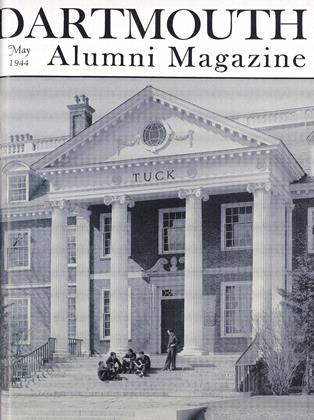THE DARTMOUTH REPATRIATE'S CLUB, photographed (above) in August, 1942, on the first return trip of the Gripsholm, consisted of ten alumni, all of whom have spent most of their adult lives in the Far East. Six of the men were stationed in China—Eskeline '16, LeCouht '14, Little '14, Livingston '28, Kendall '21, and Southwick '18—generally as Far Eastern representatives of American business concerns. The other four men were attached as Far Eastern representatives to similar businesses or diplomatic services in Japan. All seemed to have been equally surprised by the Pearl Harbor attack, but were aware of the tension between Japan and America, and had sent their wives and children home long ago.
Reports of their arrests and internment vary from leniency to brutality, and if any generalization could be made, the Americans in China suffered more seriously at the hands of the Japanese than did the Americans in Japan. Prison food rations were admittedly less than the internees were accustomed to, but the majority of the prisoners were allowed to supplement their rations by purchasing food with their own money.
A letter from C. J. Eskeline '16, military prisoner in China says: "I lost 52 pounds .... was incarcerated altogether for a period of five months and nine days I lived, ate and slept on the floor of my unhealed cell, and kept my overcoat on night and day " Joseph Teaze '18, interned in Japan, wrote: "I suffered no ill treatment." .... Japanese examined his files, and discovered a series of essays he had written on Japanese prints, decided he was friendly toward them, and allowed him to return to his home and office. He could even roam through certain parts of Yokohama. Several other American prisoners in Japan were merely confined to their homes, while the Chinese prisoners were usually taken to a prison or an internment camp.
Russell Durgin '15 had been attached to the YMCA in Japan since 1918. Both he and his wife (in picture) speak the language fluently, and have a deep understanding of the people. In a letter written in 1940, Durgin says: "Industry (in Japan) is booming as never before. Heavy industries are busy night and day Impetus is being given to the steel manufacturing process with recent installation of American steel rolling mills There is no longer unemployment, and feverish activity everywhere characterizes Japanese life and thought." After Pearl Harbor, Durgin attempted to use his influence with the Japanese to encourage better treatment for the American and British soldiers interned in Japan.
Lester K. Little '14, is the only repatriate who has returned to the Orient. In China now, he is in charge of the most important Chinese government office that a foreigner can hold. He is Chinese Customs Inspector, which includes anything from lighthouse maintenance to problems of internal revenue.
After resting and eating good American food, the Repatriates Club no doubt agrees with Warner Gerald '28, former U. S. Consul at Kobe, Japan, when he said, "All set to pitch into the war effort. And it'll have to be plenty of effort to beat the Japs and the Germans."
HOMEWARD BOUND after six months in Japanese internment camps, the "Dartmouth Gripsholm Club" held Friday night meetings during the journey. Standing, left to right: Gerald Warner '28, C. J. Livingston '28, Robert G. Kendall '21, Biddle 19. Stewart J. Teaze '18, Melvin L. Southwick '18. Front row: Carl Eskeline '16, Walter LeCount '14, Mrs. Russell L. Durgin, Lester K. Little '14, Russell L. Durgin '15.
 View Full Issue
View Full Issue
More From This Issue
-
 Article
ArticleTHE GREEN FLIES HIGH
May 1944 By ARTHUR SAMPSON -
 Class Notes
Class Notes1914
May 1944 By DR. WALLACE H. DRAKE, JOHN F. CONNERS -
 Lettter from the Editor
Lettter from the Editor'Round the Girdled Earth
May 1944 -
 Class Notes
Class Notes1917
May 1944 By MOTT D. BROWN JR., DONALD BROOKS -
 Class Notes
Class Notes1934
May 1944 By WILLIAM C. EMBRY -
 Class Notes
Class Notes1918
May 1944 By ERNEST H. EARLEY, DONALD L. BARR
Article
-
 Article
ArticlePROFESSOR COLBY'S MANUAL OF THE NEW HAMPSHIRE CONSTITUTION
December, 1912 -
 Article
ArticleRESUMPTION OF RHODES SCHOLARSHIP COMPETITIONS
April 1919 -
 Article
ArticleParents Chairman
April 1953 -
 Article
ArticleStaff Benefits Added
OCTOBER 1970 -
 Article
ArticleThe Alumni Magazine's New Editor
JUNE 1973 -
 Article
ArticleRecruiting Intellects
June • 1988

